Still free lessons for Bulgaria or the Eurozone as a sanctuary
euinside, January 30, 2010
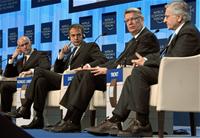 The issue which bothered economists and politicians around the world the most, especially in Europe, was whether the euro area managed to survive the strong global financial and economic crisis and which part of its rules worked as a protection mechanism. This is why the discussion about the euro area was one the most visited in Davos. Furthermore, it was organised in a very intriguing way - the premiers of Greece, Spain and the president of Latvia were put together in one place. Their countries experienced serious difficulties because of the crisis but not all of them are members of the euro area. Latvia is not. And this is why it was extremely interesting to find out who what conclusions has managed to draw. And not just interesting but very edifying for countries like Bulgaria who are trying to enter urgently the ERMII, counting that it would solve all of their problems without being necessary for them to put any efforts.
The issue which bothered economists and politicians around the world the most, especially in Europe, was whether the euro area managed to survive the strong global financial and economic crisis and which part of its rules worked as a protection mechanism. This is why the discussion about the euro area was one the most visited in Davos. Furthermore, it was organised in a very intriguing way - the premiers of Greece, Spain and the president of Latvia were put together in one place. Their countries experienced serious difficulties because of the crisis but not all of them are members of the euro area. Latvia is not. And this is why it was extremely interesting to find out who what conclusions has managed to draw. And not just interesting but very edifying for countries like Bulgaria who are trying to enter urgently the ERMII, counting that it would solve all of their problems without being necessary for them to put any efforts.
Quite naturally, the participation of the Greek prime minister George Papandreou was expected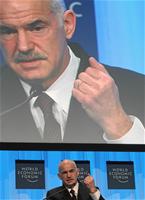 the most in the panel "Rethinking of the Eurozone". As he himself put it in an attempted sense of humour: "I am a very wanted man here in Davos - I am wanted for panels, meetings, interviews, which is understandable. I came to Davos many times and when I was a foreign minister and then I was again a very wanted man because back then Greece was a success story". Then Mr. Papandreou posed himself the questions: "But what happened since then? Is the Eurozone to blame?"
the most in the panel "Rethinking of the Eurozone". As he himself put it in an attempted sense of humour: "I am a very wanted man here in Davos - I am wanted for panels, meetings, interviews, which is understandable. I came to Davos many times and when I was a foreign minister and then I was again a very wanted man because back then Greece was a success story". Then Mr. Papandreou posed himself the questions: "But what happened since then? Is the Eurozone to blame?"
From the very beginning the Greek premier made it clear that the blame for the current situation of Greece's economy is entirely in Greece. "I don't want to politicize bu the previous government was quite bad, there was a large clientelist and patronist way of work which led to a large loss of money. Corruption developed seriously and reached highest levels. Besides, we have not undertaken structural reforms so as to change our economy, to move it forward, to make it more competitive which is possible for Greece". However, the hardest problem is that Greece lost confidence, George Papandreou underlined several times.
In the same time he announced that his government was determined to drop the budget deficit below 3% by 2012 as the requirement of the Stability and Growth Pact is. Even for this year Papandreou promised a 4% drop of the deficit. In spite of the difficulties though, Greece would realise the heavy structural reforms and would do everything it could to restore the confidence of its partners in the EU, the euro area and the investors as well. In this regard Mr Papandreou explained that it was the euro area that managed to safeguard Greece from further failures because it played the role of a buffer.
Papandreou pointed yet another problem out which affected seriously his country's efforts to escape from the swamp - something with which Bulgaria should also be very careful too - speculations. He developed further the thesis of his Spanish counterpart Jose Luis Zapatero regarding attempts for attacks on the Eurozone by political and financial interests, which both politicians did not name. George Papandreou explained that states were being used as a weak link of the euro area and this weal link was being constantly under fire. He quoted a case from Monday when Greece was negotiating for a loan which Mr Papandreou described as a kind of a confidence vote in the capabilities of the Greek economy. On the next day the Financial Times published an article claiming that Greece negotiated with China to buy Greek bonds, later denounced by Athens and Beijing. Nevertheless, the value of Greek bonds crashed.
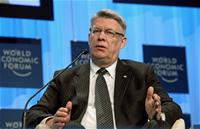 A very pleasant impression left the Latvian president Valdis Zalters because he spoke with the maturity of a man who realised his mistakes and became wiser as a result. And exactly this position of his also requires the attention and the deep analysis of Bulgaria so as not to repeat the same mistakes, as there are some indications.
A very pleasant impression left the Latvian president Valdis Zalters because he spoke with the maturity of a man who realised his mistakes and became wiser as a result. And exactly this position of his also requires the attention and the deep analysis of Bulgaria so as not to repeat the same mistakes, as there are some indications.
"Latvian currency was pegged to the euro in 2005. We expected that this peg would get us to the euro area in 3 years. This did not happen. We did not get the euro but we got the experience and it is that the government didn't maintain fiscal discipline very strictly and now we should not think about the Eurozone. In the third quarter of 2008 we had to take a very tough decision - whether to leave the peg with the euro and start devaluation or to keep the peg and introduce an internal devaluation. I should say that the second decision is working for a year now. We have achieved all our goals and even the budget deficit is lower than expected", the Latvian head of state said.
Then a more sincere statement followed: "But joining the Eurozone is not an end in itself for us because we should answer to the question what Eurozone do we want to join. We don't want simply to put the label of a member so that this could give us high rating and will create a good image for us. Our goal indeed is to recover the sustainability and to develop our economy".
With his typical style of talking which we could define as banker's diplomacy, the president of  the European Central Bank (ECB) Jean-Claude Trichet explained what exactly the euro area was and why the behaviour of each member had a large impact. To make it more comprehensible Mr Trichet made a comparison with the US by explaining that the euro area was a large economic area, consisting of 16 states with 330 mn people. And this area was a common economy, Trichet said, because these 16 countries had agreed to work within the Eu framework, with the institutions they had created themselves, in the framework of the single market and the single currency.
the European Central Bank (ECB) Jean-Claude Trichet explained what exactly the euro area was and why the behaviour of each member had a large impact. To make it more comprehensible Mr Trichet made a comparison with the US by explaining that the euro area was a large economic area, consisting of 16 states with 330 mn people. And this area was a common economy, Trichet said, because these 16 countries had agreed to work within the Eu framework, with the institutions they had created themselves, in the framework of the single market and the single currency.
In the same time he reminded that Greece was not Finland, Spain was not Germany exactly the same way as Missouri was not California nor Kansas was Florida. However the moderator of the panel - the analyst from the prestigious institute Chattam House in London Robin Niblett disagreed by reminding the president of the ECB that the US had several very serious advantages - common language, common labour unions, free movement of workers. To this Jean-Claude Trichet responded like this: "Of course there are differences, but the paradox in some aspect is that in the US there is a large specialization state by state. Of course I fully agree that we should consider this parallel very carefully. But my warning is that we are indeed talking about an enormous economy".
His forecast is that this year the budget deficit of the Eurogroup will be somewhere around 6%, according to the IMF data, while the hole in the US budget would be around 10 percent. Similar are the data for other industrialized countries like Japan, Trichet added. But he said that it was the Stability and Growth Pact that saved the countries from more serious troubles. An opinion, expressed by the other participants in the discussion, which went along without the Polish president Lech Kachinski, who did not show up.
Meanwhile Trichet recalled that every single nation had its own problems which it should solve on its own at home. He said that this especially applied to Greece.
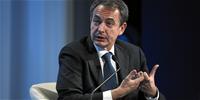 Quite nondescript was the Spanish premier Jose Luis Zapatero whose countries is now presiding the EU. It is possible though that this non-description is due to the technical problems with translation. He spoke in Spanish and almost half of the 1-hour discussion the organisers of the forum could not manage with translation so his words had to be interpreted consecutively by an assistant of his. He told the audience that his country managed to avoid a large banking crisis because it had from before developed stable banking institutions. Nevertheless, the shock from the global economic downturn affected Spain tangibly. But we should all recall where Spain started from, Zapatero advised.
Quite nondescript was the Spanish premier Jose Luis Zapatero whose countries is now presiding the EU. It is possible though that this non-description is due to the technical problems with translation. He spoke in Spanish and almost half of the 1-hour discussion the organisers of the forum could not manage with translation so his words had to be interpreted consecutively by an assistant of his. He told the audience that his country managed to avoid a large banking crisis because it had from before developed stable banking institutions. Nevertheless, the shock from the global economic downturn affected Spain tangibly. But we should all recall where Spain started from, Zapatero advised.
The Spanish prime minister also said that he did not see any serious threat to the Eurozone. "No one will leave the euro. I even think that even more countries will join in the future. And also no country has the intention of leaving the EU, on the contrary - more countries will wish to join and this is the best evidence in our successfulness. The euro area offered stability and gave us the chance to tackle the crisis with the ECB's monetary response which facilitated financial markets and institutions".
Expectedly, the discussion went on about the calls for changes in the Stability and Growth Pact criteria which some countries within the euro area do not fulfill either. According to the Latvian president however, in spite of the temptation, indeed discipline is what prevents from more serious tremors. "But it must be clear that the Euro club is a club of equals and equality should be a criterion. We should admit this. The main thing is to keep fulfill criteria".
The president of the ECB agreed with this position adding that supervision over the implementation of structural reforms should be improved and this was already agreed by member states. It was also necessary to have permanent surveillance over the development of the euro area economies. In the same time Trichet reminded that it was not the time for reflection but for serious work and not only for the euro countries but for the whole of the EU.
Charles Grant from the Centre for European Reform in London asked a very interesting question: "It is very difficult to see which government, no matter how talented or wise it is, how it will succeed to reform the political and social structures which prevent economic reforms, budget consolidation, the increase of productivity. How can you convince us that you will restore the health of your economic structures?" The question is fundamental because it puts on the scales the promises of the politicians against real factors like mentality, historical accumulations, bad discipline, unreformed administration, etc.
But according to the Spanish prime minister, the question is not that complex because Spain is 7th in the world in terms of competitiveness. Nevertheless he announced that very soon an austerity package would be introduced, the social system would be reformed as well as labour policies, especially with regard to collective agreement, skills and hiring of young people with no qualification. He defended his voters by saying that they were quite aware of their commitments to modernise the economy.
Papandreou also escaped the sharp question by announcing that each Greek was now aware that change was needed and backed the government. Even more - the cabinet had a majority in Parliament which was supposed to guarantee the implementation of its programme. The Greek premier said another thing which deserves very serious analysis: "We were successful in the past. This is not a matter of DNA but of political will and we have it". He mentioned the past successes of Greece several times during the discussion but it was those success that raised the doubts after it became clear that Athens had provided not very accurate data of its financial status so as to join the euro area. And if Greece really wants to clear its name as a country not deserving confidence, than it would be nice of the Greek government is honest till the end.
Regarding political will this is something politicians like to play with without being fully aware what it means. And the meaning is very literal: to have the will to do what might crash your rating or the rating of your party but is good for the country and the society in the long-term.
A very strange question asked a Bulgarian citizen of which presentation euinside could not hear his entire name nor the organisation he represented. It became clear only that he is Mr Kamenov. He asked the Greek premier the following: "Mr Papandreou you are a devoted European and a very good lawyer by training and by practice, I remember. Do you believe that blocking the borders is a good behaviour of a EU member and will it be possible the Greek government to pay liabilities to Bulgaria? And one more question, do you envy Bulgaria for entering the Eurozone next year?"
To the first part of the question George Papandreou said that he understood the problem with the blockade of the Bulgarian-Greek borders by protesting Greek farmers bu that he was not keen on spending 1 euro more ineffectively. "We want structural reforms and we will try to achieve them but we will not throw money away and this is part of restoring confidence". The Greek premier did not respond to the second part of the question maybe because it was inaccurate. Bulgaria cannot join the euro area next year and this is not a political decision that can be used as leverage as is the case with Macedonia's EU accession.
 Angela Merkel, Emmanuel Macron | © Council of the EU
Angela Merkel, Emmanuel Macron | © Council of the EU Benoit Coeure | © Council of the EU
Benoit Coeure | © Council of the EU Pierre Moscovici | © Council of the EU
Pierre Moscovici | © Council of the EU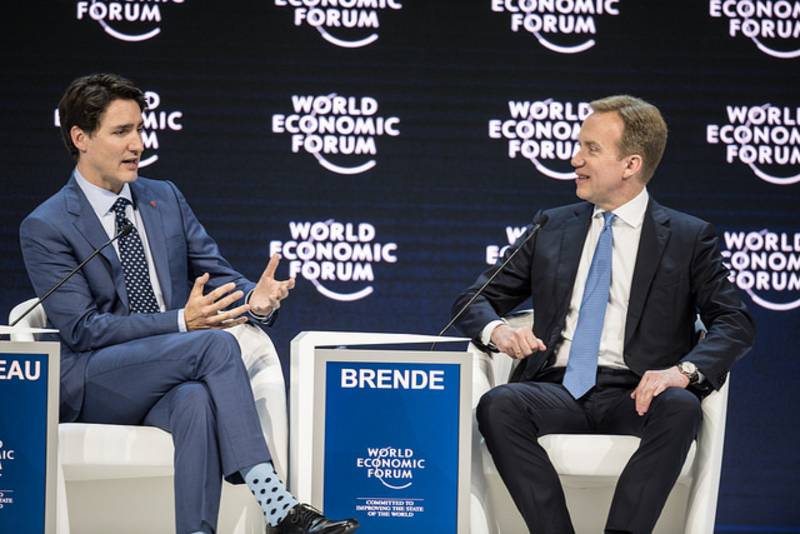 Justine Trudeau | © WEF
Justine Trudeau | © WEF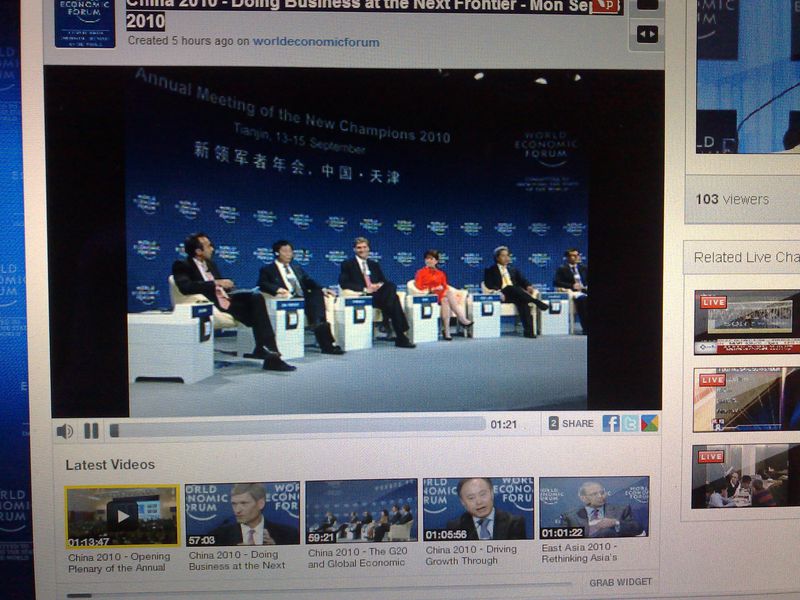 | © euinside
| © euinside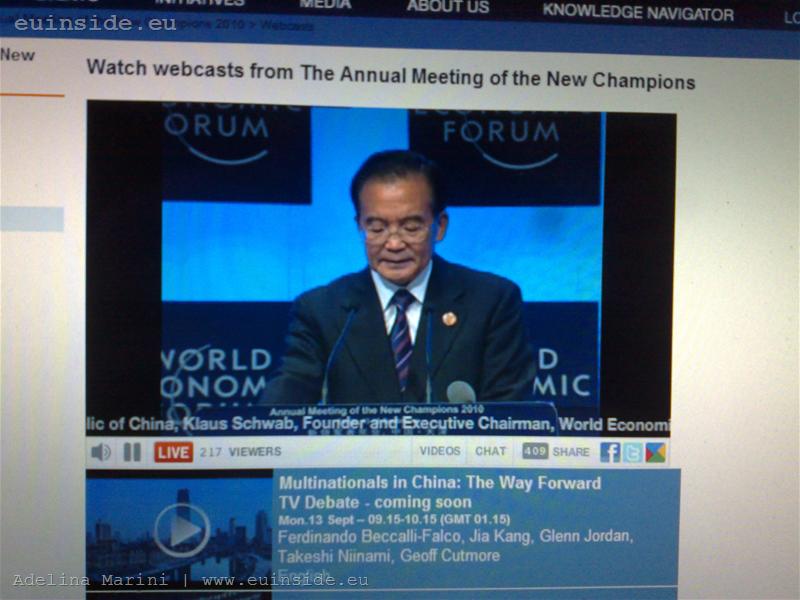 | © euinside
| © euinside